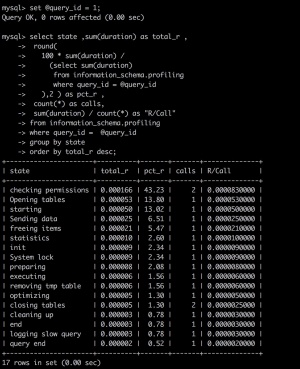前言
第二章 MySQL基准测试
2.4 MySQL的BENCHMARK()函数
set @input = 'hello world'; select benchmark(1000000, md5(@input)); select benchmark(1000000, sha1(@input));
2.5.1 http_load
安装: install_http_load.sh
wget http://www.acme.com/software/http_load/http_load-12mar2006.tar.gz tar xzvf http_load-12mar2006.tar.gz cd http_load-12mar2006/ make && make install
测试:
http_load -p 1 -seconds 10 urls.txt http_load -parallel 1 -seconds 10 -f 10 urls.txt
2.5.3 sysbench命令
#CPU test sysbench --test=cpu --cpu-max-prime=20000 run #IO test sysbench --test=fileio --file-total-size=15G prepare sysbench --test=fileio --file-total-size=15G --file-test-mode=rndrw --init-rng=on --max-time=300 --max-requests=0 run sysbench --test=fileio --file-total-size=15G cleanup #OLTP test sysbench --test=oltp --mysql-db=test --db-driver=mysql --mysql-host=localhost --mysql-socket=/tmp/mysql.sock --mysql-user=root --mysql-password=Master.123 --mysql-table-engine=innodb --oltp-table-size=1000000 prepare sysbench --test=oltp --mysql-db=test --db-driver=mysql --mysql-host=localhost --mysql-socket=/tmp/mysql.sock --mysql-user=root --mysql-password=Master.123 --mysql-table-engine=innodb --oltp-table-size=1000000 --max-time=60 --oltp-read-only=on --max-requests=0 --num-threads=8 run
2.5.5 Persona 的TCPP-MySQL测试工具
安装(在shell中执行)
wget https://github.com/Percona-Lab/tpcc-mysql unzip master.zip #准备环境变量 export MYSQL_HOME=/usr/local/mysql/ export C_INCLUDE_PATH=$MYSQL_HOME/include export PATH=$MYSQL_HOME/bin:$PATH export LD_LIBRARY_PATH=$MYSQL_HOME/lib cd tpcc-mysql-master/src make all cd ..
测试
查看数据库统计情况(自己总结的语句)
select TABLE_NAME, TABLE_ROWS,data_length/1024/1024 AS DATA_MB,index_length/1024/1024 as INDEX_MB ,(data_length+index_length)/1024/1024 as TOTAL_MB,TABLE_COLLATION from information_schema.tables where table_schema='tpcc1000' order by TABLE_ROWS desc;
第三章 服务器性能剖析
3.3.2 剖析单条性能
使用SHOW PROFILE
在会话级别使用
set profiling = 1; show profiles; show profile for query 1;
以上是默认输出,若要手动则执行以下语句:
select state ,sum(duration) as total_r ,
round(
100 * sum(duration) /
(select sum(duration)
from information_schema.profiling
where query_id = @query_id
),2 ) as pct_r ,
count(*) as calls,
sum(duration) / count(*) as "R/Call"
from information_schema.profiling
where query_id = @query_id
group by state
order by total_r desc;
